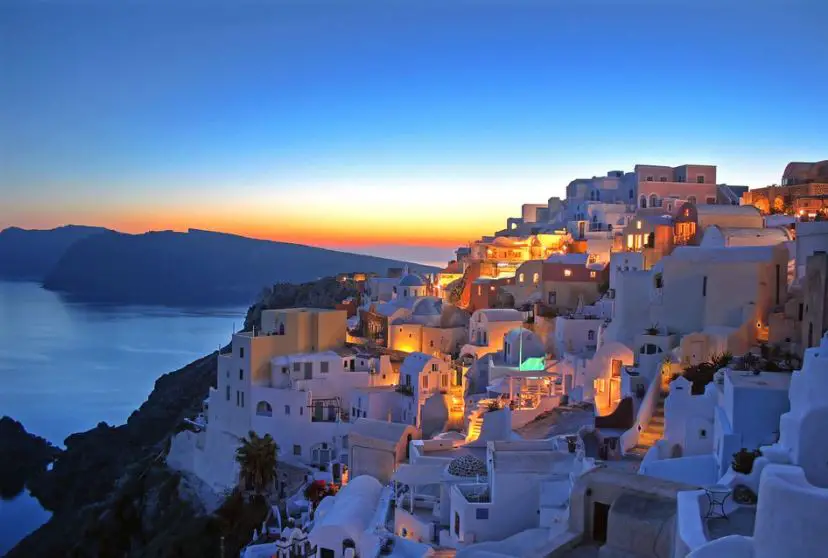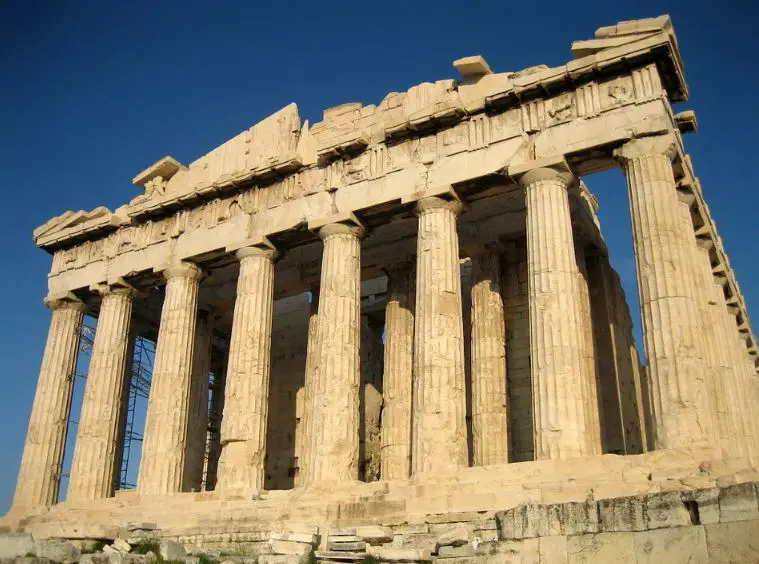Santorini, Greece: Interesting Facts,History, Things to do,Why to Visit
Post ByAdequate Travel
Santorini, Greece is an island famous for its white-washed villages, distinctive architecture, and breathtaking ocean views. Located in the Aegean Sea, it holds an interesting history and culture. It has a unique volcanic landscape that’s home to many archaeological wonders. Beyond sightseeing, it’s a great place to experience exciting activities, from shopping to cave exploration. Whether you’re looking for a romantic getaway or a family adventure, Santorini has plenty to offer. Visiting Santorini is a memorable experience that offers a glimpse into a unique and storied past. Here, you can learn more about its background, explore its attractions, and find out all of the exciting things to do. Discover for yourself why Santorini has become one of the most sought-after vacation destinations in Greece.
Greece, located in southeastern Europe, is a country known for its ancient history, rich culture, and picturesque landscapes. The birthplace of democracy, it has a long and influential past, with notable contributions in literature, philosophy, and the arts. Greece is home to many iconic archaeological sites, such as the Acropolis in Athens and the ancient city of Olympia. The country's economy has faced challenges in recent years, including a debt crisis, which has led to austerity measures and economic reforms. However, Greece remains a popular tourist destination, attracting visitors with its beautiful islands, delicious cuisine, and vibrant nightlife.greece tourist attractions offer a diverse range of experiences for every traveler.
Interesting facts
Greece: A Land of Ancient Myth and Modern Marvels
Greece is a country steeped in rich history, mythology, and natural beauty. Here are some interesting facts that showcase the unique characteristics of this renowned Mediterranean nation.
1. Birthplace of Democracy
Greece is widely recognized as the birthplace of democracy, a system of government that allows citizens to participate in decision-making. In ancient Athens, the world's first democracy emerged around the fifth century BCE. The Greeks established various democratic principles, such as equality under the law and the right to free speech. This revolutionary concept had a profound impact on political systems throughout the world.
2. Mythology and Gods
Greek mythology has fascinated people across centuries and continents. The ancient Greeks believed in a pantheon of gods who influenced various aspects of human life. Zeus, the king of gods, ruled over Mount Olympus, while Poseidon controlled the seas, and Athena represented wisdom and war strategy. These captivating stories of mythical creatures and heroic figures have left an indelible mark on literature, art, and popular culture.
3. UNESCO World Heritage Sites
Greece is home to an impressive number of UNESCO World Heritage Sites, reflecting its rich cultural heritage. From the iconic Acropolis in Athens, showcasing the majestic Parthenon, to the ancient ruins of Delphi, a sanctuary dedicated to Apollo, these sites bear witness to Greece's significant contributions to art, architecture, and philosophy.
4. Olive Oil Production
Greece is one of the largest producers of olive oil worldwide. With its ideal climate and fertile soil, the country boasts more than 120 million olive trees. The high-quality olive oil produced in Greece not only adds flavor to Greek cuisine but also contributes to the country's economy and exports.
5. Blending Past and Present
Greece seamlessly combines its ancient past with modern developments. While exploring the historic city of Athens, visitors can admire iconic landmarks such as the Parthenon and then immerse themselves in the vibrant street art scene or enjoy contemporary music and theater performances in cutting-edge venues. This harmonious blend of antiquity and innovation makes Greece a captivating destination for cultural enthusiasts.
In conclusion, Greece's legacy as the birthplace of democracy and its mythical tales, coupled with its UNESCO World Heritage Sites, olive oil production, and the harmonious blend of its ancient past with modern developments, make it a country that never fails to intrigue and inspire.From museums to parks,greece tourist attractions offer something for everyone, making it a versatile destination for all type of tourists.History of Greece
In ancient times, Greece was one of the most influential and advanced civilizations. It is often referred to as the birthplace of Western civilization as it made significant contributions to various fields such as philosophy, literature, democracy, and science.
Ancient Greece
1. City-States: Greece consisted of numerous independent city-states, each with its own government and laws. Athens and Sparta were the most powerful and well-known city-states.
2. Athenian Democracy: Athens is often seen as the birthplace of democracy. The city-state introduced a system where citizens had the right to vote and participate in the decision-making process.
3. Philosophy: Ancient Greece produced renowned philosophers like Socrates, Plato, and Aristotle. They explored ethical, political, and metaphysical questions, shaping the foundations of Western philosophy.
Alexander the Great
1. Conquest: Alexander the Great, a Macedonian king, expanded the Greek empire through a series of military campaigns. He conquered Persia, Egypt, and parts of India, spreading Greek culture.
2. Hellenistic Era: After Alexander's death, his empire was divided into multiple kingdoms. This period, known as the Hellenistic Era, witnessed the fusion of Greek and Eastern cultures.
3. Alexandria Library: Alexander founded the famous Library of Alexandria in Egypt, which became a center for intellectual and scientific advancements during ancient times.
Roman Rule
1. Greek Influence: Greece came under Roman rule in the 2nd century BC. The Romans greatly admired Greek culture and adopted many aspects of it, including architecture, literature, and philosophy.
2. Byzantine Empire: After the fall of the Western Roman Empire, Greece became part of the Eastern Roman Empire, also known as the Byzantine Empire. Greek became the official language and Christianity flourished.
3. Ottoman Empire: In the 15th century, Greece was conquered by the Ottoman Empire and remained under their rule for nearly four centuries until the Greek War of Independence in the 19th century.
Modern Greece
1. Greek War of Independence: The Greek War of Independence began in 1821, leading to the establishment of a sovereign Greek state in 1832.
2. World Wars: Greece played a significant role in both World Wars. During World War II, the country was occupied by Axis powers and suffered greatly.
3. Contemporary Greece: After World War II, Greece went through periods of political instability, military rule, and economic challenges. It became a member of the European Union in 1981 and has since made progress in various areas, including tourism, education, and technology.
Exploring the rich heritage of historical sites in greece is a journey through time and culture.Famous landmarks in Greece:
1. The Parthenon: Located in Athens, the Parthenon is an ancient temple that was built in the 5th century BC. It is dedicated to the Greek goddess Athena and is considered one of the finest examples of classical Greek architecture.
2. Santorini: A beautiful island in the Aegean Sea, Santorini is known for its picturesque white-washed buildings and stunning sunsets. Some popular attractions on the island include the villages of Oia and Fira, as well as the ancient site of Akrotiri.
3. Delphi: Delphi was considered the center of the world in ancient Greece and is famous for its oracle, who was consulted by leaders and individuals seeking advice. The archaeological site of Delphi is a UNESCO World Heritage site and includes ruins of temples and theaters.
Famous Greek personalities:
1. Socrates: An influential philosopher of ancient Greece, Socrates is known for his Socratic method of questioning, which aimed to stimulate critical thinking. He made significant contributions to the field of ethics and is revered as one of the founders of Western philosophy.
2. Alexander the Great: Alexander the Great was a military leader who created one of the largest empires in the ancient world. He expanded Greek influence across Asia, Africa, and Europe, and his military strategies are still studied today.
3. Aristotle: Aristotle was a philosopher, scientist, and teacher who is considered one of the most important figures in Western philosophy. He was a student of Plato and a mentor to Alexander the Great. Aristotle's works cover a wide range of topics, including biology, physics, ethics, and politics.
Famous Greek myths and legends:
1. The Trojan War: The Trojan War is one of the most famous stories in Greek mythology. It revolves around the conflict between the Greeks and the Trojans, sparked by the abduction of Helen, the wife of King Menelaus of Sparta. The war lasted for ten years and ended with the Greek victory through the Trojan Horse strategy.
2. The Twelve Olympians: The Twelve Olympians were the major deities of the Greek pantheon. They included gods and goddesses such as Zeus, Hera, Athena, Poseidon, and Aphrodite. Each deity had their own domain and influence over various aspects of life.
3. The Labors of Hercules: Hercules, or Heracles, is a legendary hero in Greek mythology. As punishment for killing his wife and children, Hercules was assigned twelve labors to complete. These tasks included slaying the Nemean Lion, capturing the Golden Hind, and cleansing the Augean stables.
Discover some unique facts about greece that will leave you amaze and intrigue.Culture of Greece
The Greek culture is rich and diverse, with influences from ancient civilizations, such as the Minoans and the Mycenaeans, as well as from the Byzantine and Ottoman empires. Here are some key aspects of Greek culture:
1. Ancient Heritage
The ancient Greek civilization has had a profound impact on Western culture. Greek philosophy, literature, art, and architecture are highly revered worldwide. The Greek city-states were the birthplace of democracy, and their philosophers, such as Socrates, Plato, and Aristotle, are still widely studied and admired today.
2. Mythology
Greek mythology plays a significant role in Greek culture. The ancient Greeks believed in a pantheon of gods and goddesses who ruled over different aspects of life. Stories of gods like Zeus, Athena, and Poseidon are integral to Greek literature and art. Many Greek cities have temples dedicated to various gods and goddesses, and mythology is often depicted in sculptures and paintings.
3. Festivals and Celebrations
Greeks are known for their lively festivals and celebrations, which often have religious or historical significance. One of the most famous festivals is Easter, where traditions include midnight church services, feasting, and the cracking of red-painted eggs. Other popular celebrations include Carnival, Independence Day, and various local saints' feast days.
4. Cuisine
Greek cuisine is renowned for its flavorful and healthy dishes. Traditional Greek food includes a variety of fresh vegetables, olive oil, seafood, and dairy products like feta cheese and yogurt. Staple dishes include moussaka, spanakopita, souvlaki, and tzatziki. Greek cuisine has also influenced many other Mediterranean and international cuisines.
5. Music and Dance
Greece has a rich musical tradition, with various styles and genres originating from different regions. Traditional Greek music often includes instruments such as the bouzouki, baglamas, and lyra. Greek dances, such as syrtos, kalamatianos, and hasapiko, are integral to Greek culture. These dances are often performed at weddings, festivals, and other social gatherings.
6. Sports
Greece is the birthplace of the Olympic Games, which were held in ancient Olympia. Sports were highly valued in ancient Greece, and they continue to be an important part of Greek culture today. Football (soccer), basketball, and volleyball are popular sports in Greece, with many local teams and passionate fans.
7. Hospitality
Greeks are known for their warm hospitality and friendly nature. They take pride in welcoming guests and treating them like family. Offering food, drinks, and genuine conversation is a common practice in Greek households. The concept of philoxenia, meaning "friend to strangers," is deeply ingrained in Greek culture.
Overall, Greek culture is an amalgamation of ancient traditions and modern influences, making it remarkably unique and captivating. It reflects the country's rich history and strong sense of community, which is evident in various aspects of Greek life, from art and cuisine to music and hospitality.Immerse yourself in the local culture by exploring greece's top-rated tourist attractions.Cuisine of Greece
Greek cuisine is a combination of traditional Mediterranean flavors and influences from across the Eastern Mediterranean and Asia Minor regions. It is characterized by its use of fresh ingredients, herbs and spices, and the Mediterranean triad of wheat, olive oil, and wine. Greek cuisine is also known for its simplicity, with dishes often using just a few ingredients to create bold flavors.
Key Elements of Greek Cuisine:
1. Olive oil: One of the staples of Greek cooking, olive oil is used in almost every dish. It is not only a cooking oil but also an ingredient in sauces, dressings, and marinades.
2. Herbs and spices: Greek cuisine incorporates a variety of herbs and spices, such as oregano, mint, basil, garlic, cinnamon, and nutmeg. These ingredients add depth and flavor to dishes.
3. Fresh ingredients: Greek cuisine emphasizes the use of fresh, seasonal ingredients. This includes fruits, vegetables, legumes, and seafood. Fresh herbs like dill and parsley are also common.
4. Cheese: Greece is famous for its variety of cheeses, including feta, kefalotyri, and halloumi. These cheeses are often used in salads, pastries, or as a topping for grilled dishes.
5. Grains and bread: Wheat is a staple in Greek cooking, with bread being a fundamental component of a meal. Traditional bread, such as pita or flatbread, is often served with dips or used for souvlaki wraps.
Examples of Greek Dishes:
1. Moussaka: A classic Greek dish made with layered eggplant, ground meat (usually beef or lamb), tomatoes, and béchamel sauce.
2. Souvlaki: Grilled skewered meat, typically pork, chicken, or lamb, served with pita bread, tzatziki sauce, and garnished with tomatoes and onions.
3. Greek Salad (Horiatiki): A refreshing salad made with tomatoes, cucumbers, onions, olives, and feta cheese, dressed with olive oil, lemon juice, and dried oregano.
4. Spanakopita: A savory pastry filled with spinach, feta cheese, onions, and herbs, wrapped in layers of crispy phyllo dough.
5. Baklava: A sweet pastry made of layers of crispy phyllo dough filled with a mixture of nuts, spices, and sweetened with honey or syrup.
Greek cuisine offers a delightful blend of flavors and ingredients that showcase the country's rich culinary tradition. With its emphasis on fresh and simple ingredients, Greek food offers a healthy and flavorful dining experience.Discover the untold stories behind greece unique facts, and historical treasures.1. Explore Athens
Athens, the capital city of Greece, is a must-visit destination with a rich history that dates back thousands of years. Start your exploration at the ancient Acropolis, home to iconic structures such as the Parthenon and Erechtheion. Continue to the Ancient Agora, the birthplace of democracy, and the Temple of Olympian Zeus. Don't miss the fascinating exhibits at the Acropolis Museum, showcasing artifacts from the ancient city. To experience the vibrant modern side of Athens, visit the bustling neighborhoods of Plaka and Monastiraki, known for their charming streets, shops, and restaurants.
2. Relax on the Greek Islands
Greece is famous for its stunning islands, each offering a unique experience. Santorini is renowned for its breathtaking sunsets and picturesque white-washed buildings perched on cliffs. Mykonos is known for its vibrant nightlife and beautiful beaches, while Crete boasts a mix of historical sites, magnificent landscapes, and turquoise waters. Explore the lesser-known gems such as Milos and Naxos, which offer tranquility, pristine beaches, and incredible natural wonders. Enjoy water sports, sunbathing, and exquisite Greek cuisine while island hopping in this paradise.
3. Visit the Delphi Oracle
Located in central Greece, Delphi is an important archaeological site and UNESCO World Heritage Site. This ancient sanctuary was dedicated to Apollo, the Greek god of prophecy. Explore the ruins of the Temple of Apollo, where the famous Delphic Oracle delivered prophecies. Admire the well-preserved theater and the Tholos, a circular structure that served as a meeting place for priests. Take in the stunning views of the surrounding mountains and visit the Delphi Archaeological Museum to see ancient artifacts, including the iconic Charioteer of Delphi.
4. Discover the Meteora Monasteries
The Meteora region is home to a unique phenomenon of monasteries perched on top of towering rock formations. These monasteries were built by Orthodox monks in the 14th century as a way to seek spiritual isolation. Marvel at the stunning architecture and breathtaking views from these cliff-edge monasteries. Visitors can explore some of the monasteries, but keep in mind that proper attire is required, and some may have specific visiting hours. The Meteora region also offers opportunities for hiking, rock climbing, and enjoying the natural beauty of the area.
5. Experience the Ancient City of Olympia
Visit the birthplace of the Olympic Games, the ancient city of Olympia. Located in the Peloponnese region, this archaeological site is of great historical importance. See the remains of the Temple of Zeus, which once housed one of the Seven Wonders of the Ancient World, the Statue of Zeus. Stand on the original Olympic Stadium's starting line, visit the ancient gymnasium, and explore the archaeological museum, which showcases ancient artifacts including sculptures and displays related to the Olympic Games. Immerse yourself in the history and heritage of the ancient Olympic Games.
When planning your trip to greece, be sure to include the best things to do in greece, which encompass a wide range of cultural experiences.Climate of Greece
Greece has a Mediterranean climate, which is characterized by mild and wet winters, and hot and dry summers. The country's climate is greatly influenced by its geography, with the mountains playing a significant role in shaping local weather patterns. Here are some key points about the climate of Greece:1. Mild and Wet Winters:
During the winter months (December to February), Greece experiences relatively mild temperatures. However, the northern parts of the country and higher elevations can be colder, with snowfall common in these areas. Rainfall is regular throughout the winter season, particularly in western and northern Greece.2. Hot and Dry Summers:
Summers in Greece (June to August) are characterized by hot and dry weather, with temperatures often reaching over 30 degrees Celsius (86 degrees Fahrenheit). The coastal areas and islands enjoy refreshing sea breezes, which provide some relief from the heat. Inland regions can experience even higher temperatures, with occasional heat waves occurring.3. Regional Variations:
Greece's climate can vary significantly across different regions. The western coastal areas, including the Ionian Islands, receive higher rainfall compared to other parts of the country. The eastern Aegean Islands, on the other hand, are generally drier. Northern Greece, particularly in the mountainous areas, has colder winters and cooler summers compared to the southern regions.4. Islands and Coastal Areas:
The islands and coastal areas of Greece benefit from a maritime climate, characterized by milder winters and cooler summers compared to the mainland. These areas also experience less extreme temperature variations and generally receive more rainfall, supporting lush vegetation and agricultural activities.5. Mediterranean Influences:
Greece's Mediterranean climate is strongly influenced by the Mediterranean Sea. The sea acts as a heat reservoir, keeping nearby coastal areas and islands warmer in winters and cooler in summers compared to inland regions.Overall, Greece's climate offers a pleasant environment for tourism, with warm and sunny summers attracting visitors to its beautiful beaches and islands. However, it is important to consider regional variations and plan accordingly, as the weather can differ significantly between different parts of the country.Step back in time as you visit the historical sites in greece, where the past comes alive.Popular Activities in Greece
Greece offers a wide range of popular activities for visitors to enjoy. Whether you are interested in history, nature, or beach relaxation, there is something for everyone to explore in this beautiful country.
1. Exploring Ancient Sites
One of the main attractions in Greece is its rich history and ancient sites. Visitors can explore famous historical landmarks such as the Acropolis in Athens, the Palace of Knossos in Crete, and the Ancient Theater of Epidaurus. These sites provide a glimpse into the country's ancient civilization and architectural marvels.
2. Relaxing on the Beaches
Greece is renowned for its stunning beaches and crystal-clear waters. Visitors can unwind on the beautiful sandy shores of the Greek islands or the mainland coast. Some popular beach destinations include Santorini, Mykonos, and Crete. Water activities such as swimming, snorkeling, and diving are also popular among tourists.
3. Hiking and Nature Exploration
Greece is home to breathtaking landscapes and natural wonders, making it an ideal destination for outdoor enthusiasts. Hiking trails in places like Mount Olympus, Samaria Gorge, and Vikos Gorge offer stunning views and opportunities to connect with nature. Additionally, the country's national parks, including the Prespa Lakes and Vikos-Aoos National Park, are perfect for wildlife spotting and nature photography.
4. Indulging in Greek Cuisine
Greece is famous for its delicious and healthy Mediterranean cuisine. Visitors can enjoy traditional Greek dishes such as moussaka, souvlaki, and tzatziki. Exploring local markets and food stalls is a great way to sample fresh produce, authentic Greek olive oil, and regional specialties like feta cheese and honey.
5. Taking a Boat Tour
With its countless islands, Greece offers the perfect opportunity for scenic boat tours. Visitors can hop on a ferry or take a private yacht charter to explore the stunning coastline, hidden coves, and secluded beaches. Boat tours also provide a chance to discover lesser-known islands, such as Milos, Hydra, and Naxos.
Overall, Greece provides a diverse range of activities for travelers to enjoy. Whether it's immersing oneself in ancient history, lounging on picturesque beaches, exploring natural wonders, indulging in delicious cuisine, or embarking on a boat adventure, Greece has something to offer every visitor.Plan your trip with a list of the best things to do in greece, catering to all interests.Nightlife in Greece
Greece is renowned for its vibrant and lively nightlife, offering a variety of options to suit different tastes and preferences. Whether you're looking for buzzing clubs, relaxed beach bars, or traditional tavernas with live music, Greece has it all. Here are some key points about the nightlife in Greece:
1. Athens
Athens, the capital city of Greece, is known for its energetic nightlife scene. The city caters to diverse musical genres and styles, with clubs and bars that stay open until the early hours of the morning. Some popular nightlife areas in Athens include Gazi, Psirri, and Kolonaki.
2. Mykonos
Mykonos is one of the most famous Greek islands for its vibrant party atmosphere. The island attracts international DJs and party-goers from all over the world. Mykonos is home to numerous clubs, beach bars, and stunning sunset spots that offer a memorable nightlife experience. The renowned Super Paradise and Paradise beaches are particularly popular for their lively beach clubs.
3. Thessaloniki
Thessaloniki, the second-largest city in Greece, has a vibrant and diverse nightlife scene. The city is known for its lively clubs, live music venues, and cozy bars that cater to different tastes. The Ladadika area and Aristotelous Square are popular spots to explore for a night out in Thessaloniki.
4. Greek Islands
Many Greek islands offer a unique and exciting nightlife experience. Besides Mykonos, other islands known for their vibrant nightlife include Ios, Crete, and Rhodes. Each island has its own distinctive style, with beach parties, open-air clubs, and traditional tavernas with live music.
5. Cultural Experiences
In addition to the lively party scene, Greece also offers cultural experiences during the night. Traditional Greek music and dance performances can be enjoyed in various tavernas and live music venues, providing a different kind of nightlife experience for those seeking to immerse themselves in Greek culture.
Overall, Greece provides a diverse range of options for nighttime entertainment, from energetic clubs and beach bars to traditional tavernas with live music. Whether you prefer to dance the night away or enjoy a laid-back evening with local music and cuisine, Greece's nightlife has something to offer for everyone.Step back in time as you visit the historical sites in greece, where the past comes alive.Reasons to Visit Greece
Greece is a diverse country with a rich history, stunning landscapes, delicious cuisine, and warm and friendly locals. Here are some key reasons why you should consider visiting Greece:
1. Historical and Cultural Sites
Greece is home to some of the most important historical and cultural sites in the world. From the iconic Parthenon in Athens to the ancient city of Delphi, there are numerous archaeological treasures to explore. The country also has a rich mythology, which is evident in the many temples and ruins scattered across its landscapes.
2. Beautiful Islands and Beaches
Greece is known for its breathtaking islands and stunning beaches. From the popular Santorini with its white-washed buildings and crystal-clear waters to the lesser-known Milos with its unique rock formations, there is an island to suit every taste. The beaches in Greece offer a variety of landscapes, from sandy shores to hidden coves, perfect for relaxing or indulging in water activities.
3. Delicious Cuisine
Greek cuisine is diverse and flavorful, and trying the local dishes is a treat for the taste buds. From classic dishes like moussaka and souvlaki to fresh seafood and delectable pastries, Greece offers a wide array of culinary delights. Exploring the local tavernas and street food stalls is a must for any food lover.
4. Natural Beauty
Greece boasts stunning natural landscapes, ranging from the towering mountains of Mount Olympus to the picturesque valleys of the Peloponnese. The country is also home to beautiful lakes, rivers, and gorges, perfect for nature lovers and outdoor enthusiasts. The diverse flora and fauna make Greece a paradise for hiking, trekking, and wildlife spotting.
5. Warm Greek Hospitality
The Greeks are known for their warm hospitality and friendly nature. Visitors to Greece will often encounter locals who are eager to share their culture and traditions. Whether it's striking a conversation with a friendly shop owner or joining in on a traditional Greek dance, the warmth of the people adds to the overall experience of visiting the country.
In summary, Greece offers a unique blend of history, natural beauty, delicious cuisine, and warm hospitality. Whether you are interested in ancient civilizations, relaxing on beautiful beaches, or exploring stunning landscapes, Greece has something for everyone. So pack your bags and embark on a journey to this enchanting Mediterranean destination!Whether you're a history buff or an adventure seeker, greece has an attraction for you. So, don't miss the chance to visit popular places in greeceNumber of Days Required to Visit Greece
When planning a trip to Greece, the number of days required can vary depending on several factors such as the cities and islands you wish to visit, your travel pace, and the overall experience you desire. Here are a few points to consider:
1. Mainland Greece Exploration
If you want to explore the historical and cultural treasures of mainland Greece, including Athens, Delphi, Meteora, and Olympia, a minimum of 5-7 days is recommended. This will allow you to visit the iconic ancient sites, explore museums, and fully experience the rich heritage of the country.
2. Island Hopping
Greece is famous for its beautiful islands, each with its own charm and attractions. If you plan on island hopping, the number of days required will depend on the number of islands you wish to visit and the time you want to spend on each. For example:
- If you want to visit only one or two islands, you may consider a minimum of 3-4 days per island. This will give you enough time to explore the main attractions, relax on the beaches, and experience the local culture.
- If you have a longer list of islands and want to explore more in-depth, it is recommended to allocate a minimum of 7-10 days for a more comprehensive island-hopping experience.
3. Special Interests
If you have specific interests such as hiking, diving, or experiencing local festivals, you may need to allocate additional days to engage in these activities. Greece offers numerous opportunities for outdoor adventures and unique cultural experiences, which can be included in your overall itinerary.
Example 1:
A traveler planning to visit Athens for three days and then spend a week island hopping between Mykonos and Santorini would require a minimum of 10 days in total. This will allow them to explore the ancient landmarks in Athens and spend sufficient time enjoying the unique beauty of the two islands.
Example 2:
Another traveler who wishes to focus solely on exploring the mainland might plan a trip of 7 days, allocating time for Athens, Delphi, and Meteora. This itinerary would provide a comprehensive cultural experience without island hopping.
Overall, the number of days required to visit Greece depends on your preferences, budget, and time constraints. It is always recommended to plan in advance and consider the specific attractions and activities you wish to include in your itinerary.Explore the popular places in greece, and immerse yourself in its vibrant culture.Significance of Greece
Greece holds a significant historical, cultural, and geographical importance. Here are some key points that highlight the significance of Greece:
1. Birthplace of Democracy
Greece is widely recognized as the birthplace of democracy, a system of government in which power is vested in the people. The concept of democracy was first introduced in Ancient Athens in the 5th century BC and has since influenced political systems around the world. The democratic values and principles that originated in Greece laid the foundation for modern governance.
2. Cradle of Western Civilization
Greece is often referred to as the "Cradle of Western Civilization" due to its immense contributions to the development of art, philosophy, literature, mathematics, and sciences. Ancient Greek philosophers like Socrates, Plato, and Aristotle pioneered critical thinking, ethics, and philosophical theories that shaped the Western intellectual tradition.
3. Rich Mythology and Literature
Greek mythology has played a significant role in shaping literature and art throughout history. The tales of gods and goddesses, epic heroes like Achilles and Odysseus, and mythological creatures have inspired countless works of literature, paintings, sculptures, and films. Famous Greek literary works, such as the Iliad and the Odyssey by Homer, continue to be celebrated as timeless masterpieces.
4. Cultural Heritage
Greece's cultural heritage is characterized by its ancient ruins, classical architecture, and archaeological sites. The Acropolis, including the Parthenon, is a symbol of Greek architecture and an UNESCO World Heritage Site. The preservation and restoration of these historical sites not only display Greece's architectural prowess but also attract tourists from all over the world.
5. Olympic Games
The Olympic Games originated in ancient Greece and continue to be a symbol of international unity and sportsmanship. The ancient Olympics were held in Olympia to honor the Greek gods and featured athletic competitions of various disciplines. The modern Olympic Games, established in 1896, were inspired by the ancient tradition and are now the biggest international sporting event.
These points highlight the multifaceted significance of Greece, covering its contributions to governance, culture, literature, heritage, and sporting events. The influence of Greece's historical and cultural legacy continues to reverberate globally, shaping various aspects of human civilization.From hidden gems to iconic landmarks, greece has something for every traveler's taste.What is the capital of Greece?
The capital of Greece is Athens.
Athens is a vibrant city with a rich history dating back to ancient times. It is known for its iconic landmarks such as the Acropolis, Parthenon, and Temple of Zeus. The city is also a hub for art, culture, and cuisine, with various museums, art galleries, and restaurants to explore. Athens is often considered the birthplace of democracy and has played a significant role in shaping Western civilization.
Example: The capital city of Greece, Athens, is home to the famous Acropolis, which is a UNESCO World Heritage Site and a must-visit attraction for tourists.
What is the official language of Greece?
The official language of Greece is Greek.
Greek is one of the oldest languages in the world and has a rich literary and historical tradition. It is spoken by the majority of the population in Greece, and it is also recognized as an official language in Cyprus. The Greek language uses the Greek alphabet, which consists of 24 letters. It is a unique and fascinating language that is deeply intertwined with Greek culture and heritage.
Example: In Greece, it is common to see road signs, menus, and official documents written in both Greek and English to cater to tourists and visitors.
What currency is used in Greece?
The currency used in Greece is the Euro (€).
Greece adopted the Euro as its official currency in 2002, becoming a part of the Eurozone. The Euro is a widely accepted currency in most European countries, making it convenient for travelers to use it across different countries. It is recommended to have some Euro currency when visiting Greece for transactions such as dining, shopping, or using public transportation.
Example: If you plan to visit Greece, it is advisable to exchange your currency for Euros before your trip or withdraw Euros from ATMs upon arrival for easier transactions during your stay.
What are some popular tourist destinations in Greece?
Greece offers a plethora of popular tourist destinations, each with its unique charm and attractions. Some of the top destinations include:
1. Santorini: Known for its breathtaking sunsets, white-washed buildings, and stunning caldera views.2. Mykonos: Famous for its vibrant nightlife, beautiful beaches, and picturesque windmills.
3. Athens: The capital city with ancient ruins, historic landmarks, and cultural offerings.
4. Crete: The largest Greek island offering stunning beaches, ancient ruins, and charming villages.
5. Delphi: An archaeological site known for the Oracle of Apollo and its mystical history.
Example: Santorini's scenic beauty and romantic ambiance make it a popular destination for honeymooners and couples seeking a picturesque getaway.
Discover unique facts about greece, a destination filled with rich history and natural beauty.
















